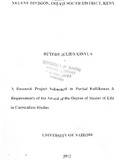| dc.description.abstract | The purpose of this study was to establish the effects of teacher- related factors on the implementation of integrated Kiswahili curriculum in public secondary schools in Nkuene division. The main objectives of the study were; to establish the effects of teacher's pre- service and in-service training on implementation of Integrated Kiswahili curriculum the effects of teaching experience on implementation of integrated Kiswahili curriculum. The effects of teacher's experience on implementation of integrated Kiswahili curriculum.
The effects of teacher's academic and professional qualifications on implementation of integrated Kiswahili curriculum, teachers'attitude towards integrated Kiswahili curriculum, the choice and use of teaching styles by teachers of Kiswahili and their effects on the implementation of integrated Kiswahili curriculum. The study also sought to identify the strategies that should be put in place to enhance implementation of integrated Kiswahili curriculum.
The study adopted the descriptive survey design. Thirty four teachers of Kiswahili language, 17 heads of Kiswahili department and 17 head teachers of secondary schools in Nkuene Division were targeted for the study. A sample of 32 teachers, 17 head teachers and 17 heads of department participated in the main study. The
study adopted purposive sampling techniques.
The majority of teachers of Kiswahili felt that teacher's pre- service and inservice training have effect on implementation of Integrated Kiswahili Curriculum, teachers academic qualifications, professional qualifications and teaching experience affect the implementation of integrated Kiswahili curriculum. The study made the following recommendations, during pre-services training in teacher training colleges, Kiswahili should be taught to teacher trainees as an integrated course to prepare them to teach in secondary schools.
The study also recommends that the Ministry of Education, the schools administration and publishers should organize frequent in-service course for teachers so as to impart skills needed in the implementation of the integrated Kiswahili curriculum in schools whenever the curriculum is revised. The study further recommended that curriculum developers should incorporate views of teachers when selecting set books to ensure that they are not too complex to students and that they are also relevant to students.
In view of the delimitations of the study the researcher suggests further research to be carried out in other secondary schools in the rest of the country and also to target students who are major stakeholders as far as implementation of integrated Kiswahili curriculum is concerned. A study should be conducted incorporating
views from students on integrated Kiswahili curriculum. | en_US |

